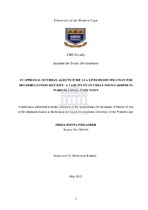| dc.description.abstract | Food security is a development challenge in South Africa with 52% of the population being food insecure and 33% at risk of hunger. Inequalities and inefficient food distribution networks lead to inadequate access to sufficient and nutritional food. Poor communities experience bad access to good food and good access to bad food. Citizens have to be satisfied with cheap, low nutritious and high calorific food leading to malnutrition, and diseases – the hidden hunger. Being hungry is more than just a lack of food; it provokes despair, humiliation, sadness, low self-esteem – perceive as the genocide of the mind. Urban agriculture has been advocated as a livelihood strategy to improve food security. The Urban Rural Development Capacity Building Project (URDCBP), a non-profit organization (NPO), initiated three urban food garden projects within Langa, Cape Town to improve food security and create employment within that community. Ward 51, Langa is the study area of this thesis. The aim of this research is (1) to assess the contribution of urban food garden projects as a livelihood strategy for food security and the livelihood outcomes thereof; (2) to determine what other livelihood strategies and coping mechanisms poor communities adopt to be more food secure; and (3) to propose recommendations to improve and expand urban food gardens. The mixed-methodology research paradigm was employed. In the quantitative design, 83 randomly selected participants completed the self-administered closed-ended questionnaires. STATA 12.1 was used as a tool for the quantitative analysis. The descriptive statistics present the socio-demographic and economic trends of the households by the scores of each variable and the existence of any relationships between the variables. Conclusions were drawn from the sample data about the populations with inferential statistics. The qualitative data collection included two semi-structured interviews with government officials and two focus group discussions with 17 community members and 13 beneficiaries respectively. Purposive sampling was used in the qualitative research and emerging themes were identified in response to the research objective supporting the quantitative analysis. The results attest that 82% of the respondents indicated that the urban food gardens contribute to their household food security. However, low levels of food security are still experience within the community. With the Sustainable Livelihood Approach as theoretical framework, the study accentuates other livelihood outcomes of urban agriculture such as improving health, improving self-esteem and improving food security. Some of the coping strategies adopted include having willpower and skills, relying on family and friends for food and borrowing and dependency on social grants. The contribution of urban food gardens to food security is minimal in the Western Cape as only 2% of the households cultivate crops as their main source of food. In the study, 63% of the respondents would like to start their own food gardens and 14% would like to extend their urban food gardens. In both instances, land has been identified as the greatest concern. With the correct strategies and support, urban food gardens can be extended to make a larger contribution to the food security levels of the urban poor. Government intervention is much needed to fight hidden hunger, poverty and food security and this requires political commitment. | en_US |

